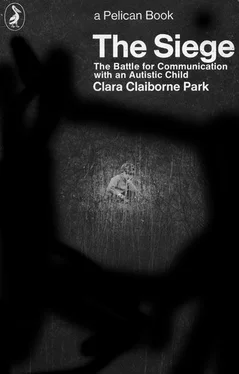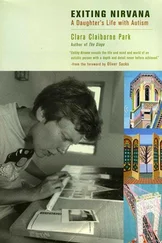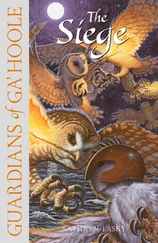Yet these tiny successes accomplished something. Narrow as Elly’s spectrum remained, it was less narrow than before. Each miniscule, apparently empty victory nourished something in Elly and in us. In Elly, perhaps some frail sense of adequacy, in us the necessary hope that our daughter had some mind hidden away inside her speechless incomprehension. Not too much hope — foolish hope was something against which we had to defend ourselves. Only enough to mount the next assault.
Elly grows older; she is nearing three. We have taken her on a picnic. Together we sit on a rock promontory beside a brook. I have carried her over the rough ground and the rocks; though she now walks gracefully and well, the slightest shift of a stone beneath her feet is enough to render her motionless. I drop a stone in the pool beside us — a splash, a satisfying plop, a new experience for a child almost without experience. Elly should be able to do this, I figure. The pool is right beside us. She need hardly stretch out her hand. I give her a stone. She has progressed in these months; I do not put it directly into her hand, but she takes it from my outstretched palm. She drops it in (that she would throw it in, with a three-year-old’s abandon, is of course inconceivable). I hand her another, another. She likes this game. The stones are in a small pile close beside us. I move slightly away. With a touch, I call her attention to the pile. She wants another stone, another plop. Will she reach out her hand the six inches it must travel to pick up another stone for herself?
No, she won’t. Not today. I do not press; I know the answer is final. My immobility is a mirror of hers. I have learned to wait.
The readiness expands, though far more slowly than for the slowest of normal children. Each new skill makes the next one easier, though not easy. And that is why I keep on — not so much because it makes life less burdensome if my child can feed herself and make use of rudimentary motor skills, although of course everything she can do for herself is one more thing I do not have to do. It is because each new skill must make her feel a little different. One works on the assumption — it must be, in fact, a faith — that the tiniest success must leave a trace, must move the child, however imperceptibly, towards the experience of adequacy. So, as one thinks of them, and that is very slowly, one sets up the preconditions for new successes, even if these are to be no more impressive than picking up a stone and dropping it into the water. Each new accomplishment is not only a bolstering of confidence, it is an incursion into that guarded emptiness, an enrichment of that terrible simplicity. And though Elly resists each foray, we suspect (for a long time it is no more than a suspicion) that she is glad of them. She can take no initiative towards growth, yet she is no frozen adult but a living child. We must believe she will be glad to grow.
So we keep pressing, not too much, but not too little either, in ways so simple that it seems ludicrous to record them. A few months after she is three she becomes interested in lights. She knows that light comes when one pulls a string or moves a switch. I have not taught her, nor could I; this is just the sort of thing it turns out she knows. When she wants light she moves my hand to the switch. But it is my hand that is her tool, not her own; she cannot move the switch herself. Teaching her to turn on a light is a process of choosing the easiest switch in the house. It cannot be the string, which must be pulled, nor the old- fashioned switches that require pressing, for the muscular effort required of this strong child must be imperceptible. I take her hand. With it I flick the switch down. Down first, lights out, for that is easier. It takes time — how long I don’t remember. At length she can do it for herself.
Though she is fascinated with water, activating a faucet is harder. Using, perhaps, her light-switch experience, she learns of herself to use the kitchen faucet, which requires only a simple push. But an ordinary faucet requires both pressure and twist. I put Elly’s hand to it; wrist and fingers go limp. My whole hand covers Elly’s; using hers as a tool, I turn on the faucet. This first time, and again, and again, all the force is mine. Elly likes water and she has no objection to repetition. Imperceptibly — I hope it is imperceptibly — I lighten my pressure. The small hand beneath mine is no longer quite limp. It seems that there are muscles there after all. I move my hand a quarter of an inch up hers as I turn the water on again. Another quarter inch. A half. Infinitely gradually I withdraw my hand, up her fingers, up her wrist. She goes on turning on the water . My hand moves up her arm. Finally all that is left is one finger on her shoulder, to enable her to maintain the fiction that it is I, not she, who is performing the action. We have been together over the basin a full hour. But the work is not yet over; next day we must go over the process again to re-establish the skill, but we can do it more rapidly. Then I remove my finger; my presence now is enough. The next day she does it alone, thrilled, delighted, over and over. She understands everything about the process, even things I thought too difficult to teach. She never lets the basin overflow, she never turns on the hot water. But the work is not quite done. For weeks she will require a brief retraining before every unfamiliar faucet. It is a long time before the new mastery can be fully accepted.
It is as if Elly were more comfortable with an image of herself that could not do things. Her inabilities seemed not only willed but jealously guarded. I remember her at four, after considerable progress of the kind described here, getting ready for her bath. She cannot yet undress herself, but for some weeks she has been taking off her shoes once I untied them. Today she refuses, laughing at me. (Learning to tease shows of course great progress in human contact, but that belongs in a later chapter.) I wait, resisting the temptation to assist her. The shoe is on so loosely that it falls off. Elly, who ‘cannot’ put on her shoes, sizes up the situation. Instantly and expertly she puts the shoe back on. She was not going to take it off and she didn’t!
Whatever it was that held Elly back from using her hands also inhibited her use of her body. The extreme physical caution that had made it possible for us to ignore the dangers of stairs and edges when she was small did not abate. We could only infer that she was capable of balancing and climbing like other children, as we had inferred that she could walk. For three years things on upper shelves were safe; if Elly could not reach them, she would not push over a chair and climb to get them. For more than four years she was lifted in and out of her crib. As time went on I kept the sides down and set a chair beside the bed. Elly would tentatively put her legs over the side on to the waiting chair and draw them back again. Yet we remembered a strange disturbed night a year before when the older children, left to baby-sit for an Elly who, because of guests, had been put to sleep in a playpen in an unfamiliar room, had had to call us home because Elly had got out three times. How had she done it? The playpen sides were higher than the crib’s. Nobody knew; she hadn’t, of course, performed in public. When I returned and put her back in the pen, she stayed there. Naturally; she couldn’t climb, could she?
It was the same with stairs. One day in November — she was almost two and a half — she gingerly descended the stairs of a local museum, erect on her two feet. The stairs were wide and shallow, easy to manage. It was April before she walked down the taller stairs at home. Years passed, her legs got longer, but still she descended like a two-year-old, both feet touching each step. She was six before she went down like a normal child, foot below foot.
Читать дальше












